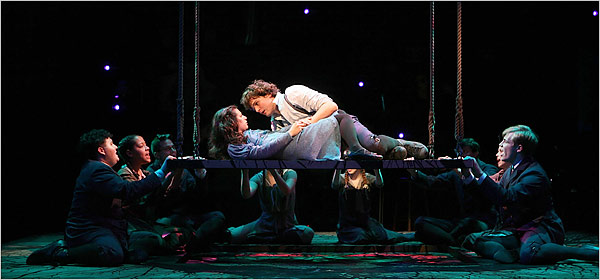 “God, talking to you is like trying to sew a button on cottage cheese!”
“God, talking to you is like trying to sew a button on cottage cheese!”
Mitchell, The Little Dog Laughed
“Love is Companyyyyyyyyyyyyyyyyyyyyyy!
ensemble, Company
Reports of its eminent demise are exaggerated—again. These words echoed as I left the Barrymore Theater after catching John Doyle’s imperfect revival of Company. Some of the voices are weaker than those on my oft-played original cast album, and while the new orchestrations serve up unexpected touches of wit, you yearn for the brassy, heartrending boom that signaled a new era in musical theater back in 1970. Look past these surfaces, though, and you’ll find that this show serves up enough Sondheimian truths (ably abetted by George Furth’s book) about relationships—about existence—to rival anything heard in Shakespeare or the Greeks. Company reveals how, married or single, we’re all ‘like Eliza on the ice,” wrestling with our fragilities and loneliness as we grope to make sense of our rapidly escalating 21st century blues.
Such truths are why we still bother to go to the theater. For many of us this is church, the amen corner where our lives bounce off the stage back into our hearts and minds, deep into our souls. Whatever organized religion promises in terms of salvation and enlightenment, the theatre at its best delivers tenfold. Though life has often let me down, the theatre—sometimes at its most negligible—has never failed to lift me up.
Often a moment is worth the price of admission. Spring Awakening, the Duncan Sheik/Steven Sater adaptation of Frank Wedekind’s 1891 morality tale, is full of them. A memorable one occurs early in Act II: to the strains of the aching “Left Behind,” a funeral procession mourns the death of Moritz, a teen suicide. When the dead boy’s father pauses in front of the grave, the singer places a hand on the elder’s heart; its removal prompts a scalding collapse into grief (finely calibrated by the actor Stephen Spinella). Throughout the show bodies in motion say it all: from the innocent grace depicted in scenes of adolescent sex, to those periodic spasms of teen spirit wrought by Bill T. Jones’ primal choreography, to a rock score that amplifies the enduring, inevitable split that occurs when communication fails and generations clash.
We see ourselves often in characters as divorced from us as Bush is from Clinton. In Grey Gardens, the cracked sensibility of Christine Ebersole’s Little Edie compels distance—but wait. As the second act unfurls (sadly it’s one of those musicals that doesn’t take off until then) this turbanned wonder disarms us with shimmering insights as she reveals a soul rife with the dreams and disappointments of every human being. Her eccentricities convulse us with laughter, but the broken heart that beats beneath her makeshift couture is a sound that will haunt for days.
See them all. With luck, these works will weather Broadway’s winter doldrums to reap kudos come spring’s award season. Sadly, one show won’t: The Little Dog Laughed, a stinging, take-no-prisoners comedy at the Cort, closed on February 18. Spontaneous guffaws rocked the house the night I saw it; you’d think such a response would generate the word of mouth that translates into boffo sales. Ironic: iconoclasm fuels Spring Awakening, Gardens and Company, an element that smart money says will kill a show in a shot; Dog was a classic farce, as funny as any you’re likely to find. But go figure: the horse had no legs. Our loss. (Photo, Sara Krulwich)
